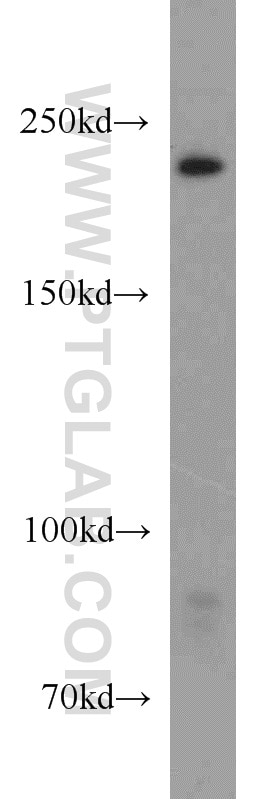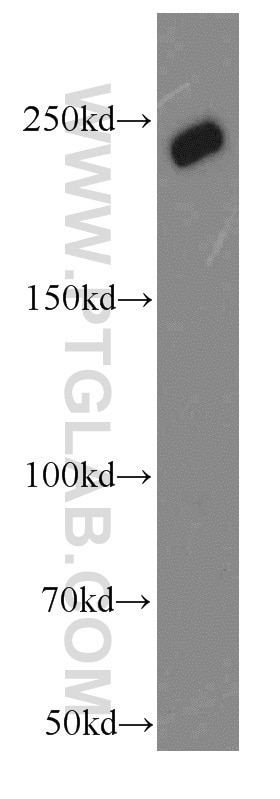Tested Applications
| Positive WB detected in | K-562 cells |
Recommended dilution
| Application | Dilution |
|---|---|
| Western Blot (WB) | WB : 1:500-1:1000 |
| It is recommended that this reagent should be titrated in each testing system to obtain optimal results. | |
| Sample-dependent, Check data in validation data gallery. | |
Published Applications
| KD/KO | See 1 publications below |
| WB | See 2 publications below |
Product Information
20023-1-AP targets URB1-Specific in WB, ELISA applications and shows reactivity with human, mouse samples.
| Tested Reactivity | human, mouse |
| Cited Reactivity | human |
| Host / Isotype | Rabbit / IgG |
| Class | Polyclonal |
| Type | Antibody |
| Immunogen |
Peptide Predict reactive species |
| Full Name | URB1 ribosome biogenesis 1 homolog (S. cerevisiae) |
| Calculated Molecular Weight | 254 kDa |
| Observed Molecular Weight | 240-260 kDa |
| GenBank Accession Number | NM_014825 |
| Gene Symbol | URB1 |
| Gene ID (NCBI) | 9875 |
| RRID | AB_10667000 |
| Conjugate | Unconjugated |
| Form | Liquid |
| Purification Method | Antigen affinity purification |
| UNIPROT ID | O60287 |
| Storage Buffer | PBS with 0.02% sodium azide and 50% glycerol, pH 7.3. |
| Storage Conditions | Store at -20°C. Stable for one year after shipment. Aliquoting is unnecessary for -20oC storage. 20ul sizes contain 0.1% BSA. |
Background Information
URB1, also named as C21orf108, KIAA0539 and NPA1, is a 2,271 amino acid protein that is homologous to the S. cerevisiae protein URB1 which is a nucleolar protein involved in the normal accumulation of 25S and 5.8S rRNAs and may also play a role in the biosynthesis of the 60S ribosomal unit. Also localized to the nucleolus, human URB1 is thought to have the same functions as S. cerevisiae URB1. The antibody is specific to URB1.
Protocols
| Product Specific Protocols | |
|---|---|
| WB protocol for URB1-Specific antibody 20023-1-AP | Download protocol |
| Standard Protocols | |
|---|---|
| Click here to view our Standard Protocols |
Publications
| Species | Application | Title |
|---|---|---|
FEBS Open Bio Knockdown of RFC4 inhibits cell proliferation of oral squamous cell carcinoma in vitro and in vivo | ||
Nature Nucleolar URB1 ensures 3' ETS rRNA removal to prevent exosome surveillance
|






